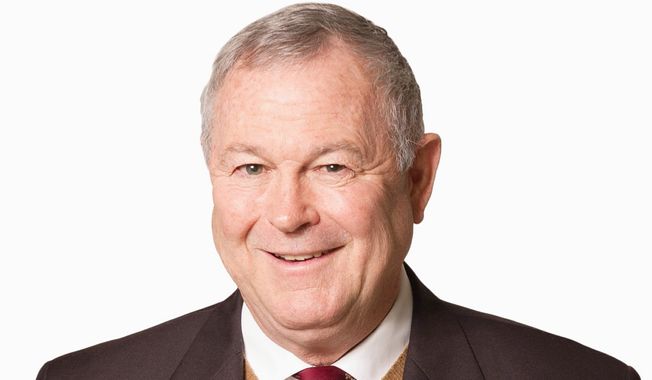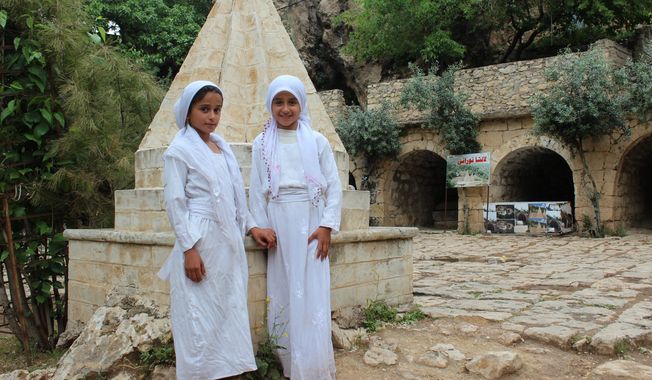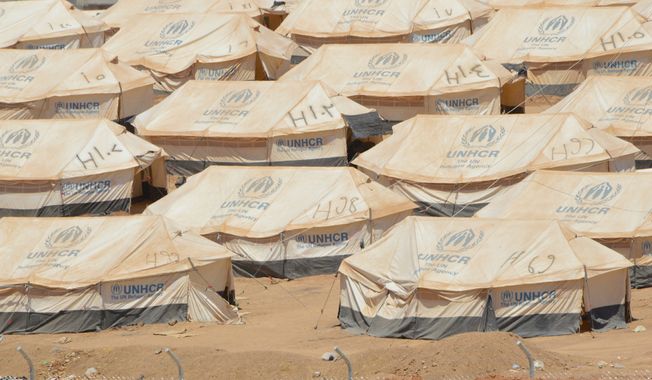The Kurdistan Region: Strategic U.S. Ally in a Tough Neighborhood
The Kurdistan Region: Strategic U.S. Ally in a Tough Neighborhood is a Special Report prepared by The Washington Times Advocacy Department.
Recent Stories
Why America should support independent Kurdistan
Kurdistan24, in conjunction with The Washington Times, is sponsoring a conference on Capitol Hill, entitled, "The Kurdistan Region: Strategic U.S. Ally in a Tough Neighborhood."
Give Iraqi Kurds a nation they can call their own
The Kurds of northern Iraq have demonstrated their commitment to open and honest government and to their loyalty to the United States and the West. I think they deserve a chance at independence. The U.S. and Iraqi governments should support them.
Kurdish independence will stabilize the region
The Kurds of Northern Iraq will hold a referendum on independence in September, and the question before Congress is whether we should support their dream of self-determination or vote to make it a dream deferred.
U.S. and the Kurdish Region:
In February of this year, I was grateful for a return visit to Erbil, the dynamic capital city of Iraqi Kurdistan, a semi-autonomous region in Northern Iraq that is governed by the Kurdish Regional Government.
Ghastly 1988 attack on Kurdistan must not be forgotten
As co-chair of the Kurdish Caucus here, I think it's so important that we stop every year and commemorate and remember [the March, 16, 1988 Halabja chemical attack that killed or injured 15,000 Kurds by former dictator Saddam Hussein].
Self-determination will lead to prosperity, stability
This is a year of regeneration for Iraqi Kurdistan, a time when its people will shed the crippling burden of war and uncertainty and start to shape their future — on our own terms.
Embrace the Kurdish independence referendum
This Sept. 25, Iraqi Kurds will hold a long planned referendum in which, as in the 2005 vote, an overwhelming majority will express their desire to become an independent state. How the Kurdish, Iraqi central government, United States and regional leadership handle this foregone conclusion is critical to stability in the region.
Kurdistan referendum stands on 'solid legal footing'
Two hundred and forty-one years ago this month our Founding Fathers declared America's independence. When they debated the issue, they could not agree on whether the colonies were prepared to be self-sufficient, their internal differences could be resolved, or if they were even ready to withstand the challenges of foreign powers. But they knew they had a compelling legal and moral basis for separating from Great Britain. It was rooted in the principle that governments must derive "their just powers from the consent of the governed," as Thomas Jefferson wrote.
Can the Kurds win public -- and American -- support?
On Sept. 25, the Kurdistan Region of Iraq has scheduled a "binding" referendum on independence — a clear message the Kurds will no longer tolerate the repeatedly violated promises of Baghdad.
Kurds: No longer the forgotten people
My experience with the Kurds was in December 2003, when I was with a U.S. Army Reserve Civil Affairs unit near Suleimaniya. I had spent many years on active duty in the Middle East as a Foreign Area Officer, but knew very little about the Kurds, as my studies at the American University of Beirut were almost totally focused on Sunni Arabs, Persians and the Palestinian issue.
Don't blame the Kurds for Iraq's unraveling
Fighting ISIS created a false sense of national unity among Iraqis. Now that Mosul is liberated, Iraqis must confront their rivalries and decide the country's future. Prime Minister Haider al-Abadi has called for national unity, but Iraq remains deeply divided.
'The Kurdish moment has come'
It has been nearly 100 years since the world promised the Kurdish people a nation of their own. That promise came as World War I drew to an end. At a Paris peace conference, the victors in that great war signed the Treaty of Sevres, which guaranteed self-determination for the Kurds and named them specifically as overdue for nationhood.
5 reasons for U.S. to support an independent Kurdistan
Post-Mosul Iraq is no place for negotiators wearing loafers and pin-striped suits. It's a place of dusty boots and bare-knuckle competition, where results on the ground are a function of muscle and not of eloquence. It's a place where Tehran applauds Washington's polite adherence to a One-Iraq policy, even while substantial Iranian combat power flows insidiously into Iraq to effect a functional annexation of the lion's share of Iraqi terrain. While Washington urges everyone in Iraq to just get along, they don't, and they never have. Continued American supplication is pointless.
The Kurds: An excellent example of 'what can be'
I had no idea who the Kurds were until April 6, 1991.
Understanding the Kurdistan Region as a strategic U.S. ally
Last May, Lt. Gen. Vincent Stewart, director of the Defense Intelligence Agency, told the Senate Armed Services Committee that Kurdish independence "is on a trajectory where it is probably not 'if', but 'when.'"
The Peshmerga: Fearsome, fearless fighters
My first deployment to Iraq was as an embedded adviser to a reflagged Kurdish Peshmerga battalion in Mosul in 2005. The 3rd Battalion of the 4th Brigade of the 2nd Iraqi Army Division was a Peshmerga unit from Duhok and would be responsible for conducting counterinsurgency operations in West Mosul at the height of the Sunni insurgency.
Key factors beckon support for Iraqi Kurds
Once the war with ISIS is concluded in Iraq, the Arabs — both Shia and Sunni — will demand our removal; only the Kurds will want us to remain. It is also certain that Iran will exert far more control over Baghdad than they have in the past.
The Kurds: Potential strategic partners the U.S. deserves
This year is the 25th anniversary of the election of the first parliament and government of the Kurdistan Region of Iraq (KRI). Thanks to the "Safe Haven" that the U.S. and its European allies created in 1991 to protect the displaced Kurdish population from Baghdad's brutal attacks, the Kurds turned a crisis into an opportunity to build a forward-looking nation with democratic aspirations. The journey was a tough one, with many successes and failures, but U.S.-KRI relations grew stronger and developed into a mutually rewarding partnership.
Kurdistan referendum is legitimate
Since the Kurdish Regional Government of Northern Iraq, backed by its local legislative assembly, decided to organize a referendum on self-determination, both positive and negative reactions were fielded in Iraq, the Middle East and internationally. Baghdad and the two main neighbors of Iraq — Iran and Turkey — expressed opposition to the Kurdish popular consultation, each one for different political reasons. Beyond the region, Western European governments expressed concerns yet not irreversible opposition. Europe's major powers have at the same time opposed separatism within their own borders (as in Northern Ireland, Basque and Corsica) yet have supported it in the former Yugoslavia twice.
The threatened future of Christianity in Iraq
I write on behalf of the remaining Christians of Northern Iraq, a threatened and persecuted population, which looks warily to the coming years.
Kurdistan: A proven sanctuary and 'safe haven' for refugees
The people and regional government of Iraqi Kurdistan have long played a vital role in protecting Christians, Yazidis and all religious minorities. Muslims and non-Muslims alike are free to practice their religion openly in the Kurdistan Region of Iraq.
'We must seek the most promising scenario'
When Kurdistan is discussed as a haven for the Christians and all minorities in Iraq, one must first recognize that they are currently a Region of Iraq.
What is next for refugees in Kurdistan?
In recent years, as the war with ISIS has raged, the relatively stable Kurdistan region has been hailed as a "safe haven," "beacon of democracy" and "the other Iraq."
Independence will open doors to investment in Kurdistan
The liberation of Iraq in 2003 brought with it economic opportunities that the people of Iraq had never before imagined. In Kurdistan, we seized upon this chance to grow our society in the ways we had long dreamed — in the first 10 years annual per capita GDP grew from around $500 to $7,000. Although the past few years have tested our resiliency, Kurdistan remains a safe investment environment focused on diversification and reforming for better governance.
Kurdistan Region: Untapped economic potential
I have no doubt that the economy of the Kurdistan Region will experience significant growth as early as next year. There are several reasons why.
Confronting the current Middle East alignment
With the imminent defeat of the Islamic State in Mosul, Iraq and in Raqqa, its declared capital in Syria, one of the Trump administration's key objectives is about to be achieved.
Negotiating an amicable split: It's time for Kurdistan and Iraq to go their separate ways
Iraqi security forces with the support of coalition forces are finally getting close to defeating ISIS in Iraq, which begs an important question: What comes next? More to the point, what governmental structure would best protect the many ethnic groups that live there?





























